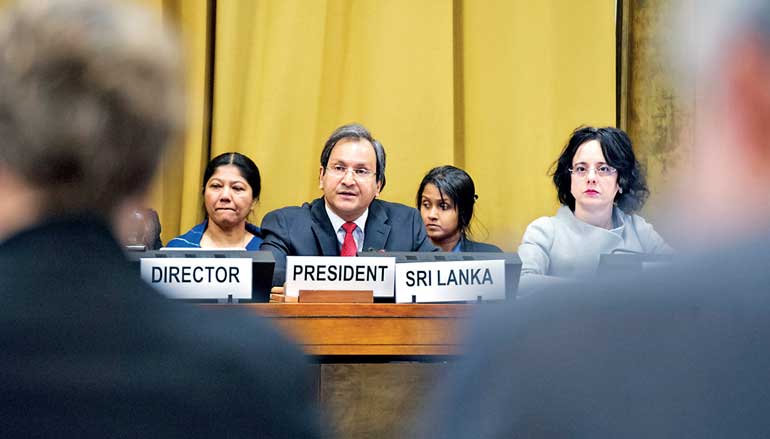Sunday Feb 22, 2026
Sunday Feb 22, 2026
Monday, 2 April 2018 00:44 - - {{hitsCtrl.values.hits}}

Ambassador Aryasinha chairing the Conference on Disarmament
Permanent Representative of Sri Lanka to the UN in Geneva, Ambassador Ravinatha Aryasinha, has said that Sri Lanka makes its best contributions to the international community when it leads from the centre rather than positioning itself in a manner “either to be taken for granted or to remain isolated”.
The Ambassador, who relinquishes his tour of duty as Sri Lanka’s Permanent Representative to the UN in Geneva this week, made this observation in his farewell address to the Conference on Disarmament (CD), where last month under Sri Lanka’s Presidency, the Conference unanimously adopted Decision CD/2119 setting up five subsidiary bodies to commence substantive work. Addressing the High-Level Segment of the CD, UN Secretary-General António Guterres, welcoming this Decision, stated: “I believe you are off to the best start in nearly two decades and I look forward to building on this new momentum.”
Recalling that for long years Sri Lanka had been an active player in the field of disarmament, Ambassador Aryasinha expressed satisfaction that Sri Lanka was once again able to make a meaningful contribution through CD/2119, during its recent presidency. He said the decision “was a balance between flexibility and safeguards, and it offered a framework for a more focused and continued debate on all core issues on the CD agenda.
“I believe this has the potential of being an irreversible first step in getting the CD back to work, and in asserting its credibility as the single multilateral forum for negotiating disarmament treaties,” he said.
Referring to the dynamics that resulted in this CD Decision, he believed that “the cardinal principles upheld in arriving at CD/2119 - inclusiveness in consultations, transparency in engagement without a preconceived agenda and allowing adequate time to deal with the genuine security concerns of all member states - will undoubtedly help as we move through the next steps of operationalising this decision and bringing the Conference back to negotiations.” Noting that the CD’s “rule of consensus has not been the reason for the CD’s stalemate, but it is the lack of political will” and that “clearly the issue is not procedural, but political”, Ambassador Aryasinha said countries would be better served “if we use the rule of consensus as a tool for compromise, rather than as a veto.”
Emphasising the significance that following the adoption of CD/2119, delegations which had continued to show scepticism about the CD process in the past had expressed their willingness to work constructively towards the realisation of the its goals in order to get the CD back to work, he cautioned that CD members must be conscious that unless this window of opportunity was seized upon, the momentum could be lost.
While congratulating the current President of the CD Switzerland for confirming the appointment of five coordinators on the principle of equitable geographical representation as stipulated in the February decision and a schedule of meetings based on equitable time, Ambassador Aryasinha remarked: “Eventuality, whether CD/2119 was a beginning or an aberration remains to be seen. But one thing is certain, the cost of standing in the way of the CD moving forward has become greater.”